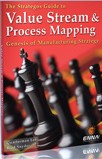Core Disciplines
Most waste is invisible. Nor is elimination easy. A set of techniques that identify and
eliminate waste has evolved: "Lean Manufacturing."
►Cellular
Manufacturing
►Pull Scheduling (Kanban)
►Six Sigma/Total Quality
Management
►Rapid Setup
►Team Development
These are core disciplines. Not every organization requires them all. Others require
supplementary disciplines. Determining which disciplines are most important and/or urgent is the
subject of our Lean Implementation series. You
may also find our series on
Leadership useful.
Tools
Value Stream Mapping and
Process Mapping are two valuable tools
that can help eliminate waste and streamline work. Group Technology can sort out workflow in
complex product mixes. Other analysis tools are also available.
Inventory
Besides core
disciplines and tools, there is an overall theme of
inventory reduction. Inventory hides waste. Almost every imperfection or problem
creates a need for inventory. Hence, inventory is a result and measures the imperfection
of the system.
 People &
Technology People &
Technology
Factories include people. To function well, people and technology must integrate in a system
exploiting the strengths and minimizing the limitations of each component. Every core
discipline has a psychological component. Eric Trist called this a
Socio-Technical System.
|
The Systems Perspective
 The
core disciplines are interdependent. Each acts upon and improves the others in a continuous
"Virtuous Circle". Over time, this reinforcement builds momentum like a snowball rolling
downhill. Results for the system are greater than the separate effects. For more, see "Manufacturing
As A System." The
core disciplines are interdependent. Each acts upon and improves the others in a continuous
"Virtuous Circle". Over time, this reinforcement builds momentum like a snowball rolling
downhill. Results for the system are greater than the separate effects. For more, see "Manufacturing
As A System."
Science Vs. Slogans
Strategos prefers a scientific and engineering perspective rather than slogans, edicts,
imitation and proselytizing. Science necessarily includes the human disciplines since all
factories are Socio-Technical Systems.
This allows us to carry principles into new and different industries where there are no
examples to copy. See our page on Factory Science.
"...the tools and artifacts were developed to deal with very particular problems that were
affecting people in very particular circumstances. Working under different circumstances
presents different problems, which requires different tools and different thinking." So says
Steven Spear of Harvard who wrote
"Decoding The DNA of the Toyota Production System."
Using This Site
You will find useful information and tools here. The "Resources"
section has various Lean Manufacturing articles, information and perspectives. For example, the
"Assessment" helps determine your current
position.
The training section details Strategos programs
and Kaizen Events. It can assist you in grasping the body of required knowledge. You might also
want to visit the page on "Developing Your
Training Plan. "About Strategos"
outlines our approach and tells you about the Strategos team.
Download expanded & Printer-Friendly Version
of This Page in PDF.
|





